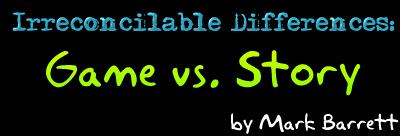11/10 - 11/12 @ Montréal, Canada
12/5 - 12/7 @ Shanghai, China
12/24 - 12/27
2/28 - 3/4 @ San Francisco, CA
More events...
2406 articles in the reference section.
Help us fight cancer!
Join SETI Team GDNet!

|
The following definitions are assumed in this work:
In the interactive entertainment industry there is often a vague or common use of the terms 'story' and 'game' which erroneously implies - even though the utterer may know it to be untrue - that story and game are one and the same aspect of interactive design, and one and the same experience for the interactive user. This inaccuracy is understandably not important to the general public, or even to veteran users of interactive products, because it doesn't affect their enjoyment of a product labeled with either descriptor. But clear definitions of each concept should be critically important to designers, because without an understanding of what a story and a game are as both methods and techniques of entertainment, the possibility of achieving emotional involvement is greatly diminished and ultimately left to chance. Understanding story and game, and the relationship between the two, is a prerequisite to the construction of, as opposed to the categorization or marketing of, interactive entertainment which achieves sustained emotional involvement. In the definitions for story and game offered at the beginning of this essay, I've defined them as elements of technique to be used in design. This not only aids in construction, but allows for theoretical discussion of those hybrid products which might have some aspects of story and some of game, without insisting that they be forced into either category. As will be seen, there are problems with mixing story and game, but that shouldn't be our point of departure. The immediate goal is not to classify or limit designs at all, but simply to identify what process brings to the interactive drawing board, so that it can be used to best effect. On the surface it doesn't look like there's any real reason to confuse the two terms. Certainly there are common-language uses of both terms that intrude on each other's turf - a "Cinderella story" in sports, say, or "running a game" on someone, as used when accusing someone of making up a story for the purpose of deceit - but our definitions seem to steer us clear of these grammatical rocks. Still, this kind of fraternization between terms can be seen to reach all the way into the interactive designer's workshop, as is evidenced by any number of interviews in which designers talk openly about new 'game' ideas in the works, when in fact there is little or no actual interactivity in the product, let alone game play. If we were sure that this was only a result of colloquial usage it might be all right to dismiss it. But how sure can we be that the designers themselves are not confusing the two, or that they have any real idea what defines each as a method of entertainment? There are, of course, similarities in the methods of each which may lead to confusion. The most basic of these similarities is the fact that both games and stories derive their emotional power from uncertainty of outcome. When preparing to engage in a story or witness a game, almost all of our involvement centers around what will happen at the end - which we expect, or at least hope, will contain both the greatest moment of uncertainty of outcome, and the resolution of that uncertainty. Of course we're interested in the sights along the way - great plays in sports and games, wonderful emotional moments in film and literature - but we're interested in those sights as stepping stones to, and portents of, the ending. Who will win the game? What will happen to the hero in the final act? But there is also a critical difference between story and game as it relates to uncertainty of outcome. Simply put, the emotional power of a story's outcome is generated by a storyteller through pre-determined and organized techniques and methods, which the audience witnesses. This contrasts sharply with the emotional power of a game's uncertainty of outcome, which is derived from witnessing a contest which is not pre-determined.
|
|||||||||||
|
|
|||||||||||